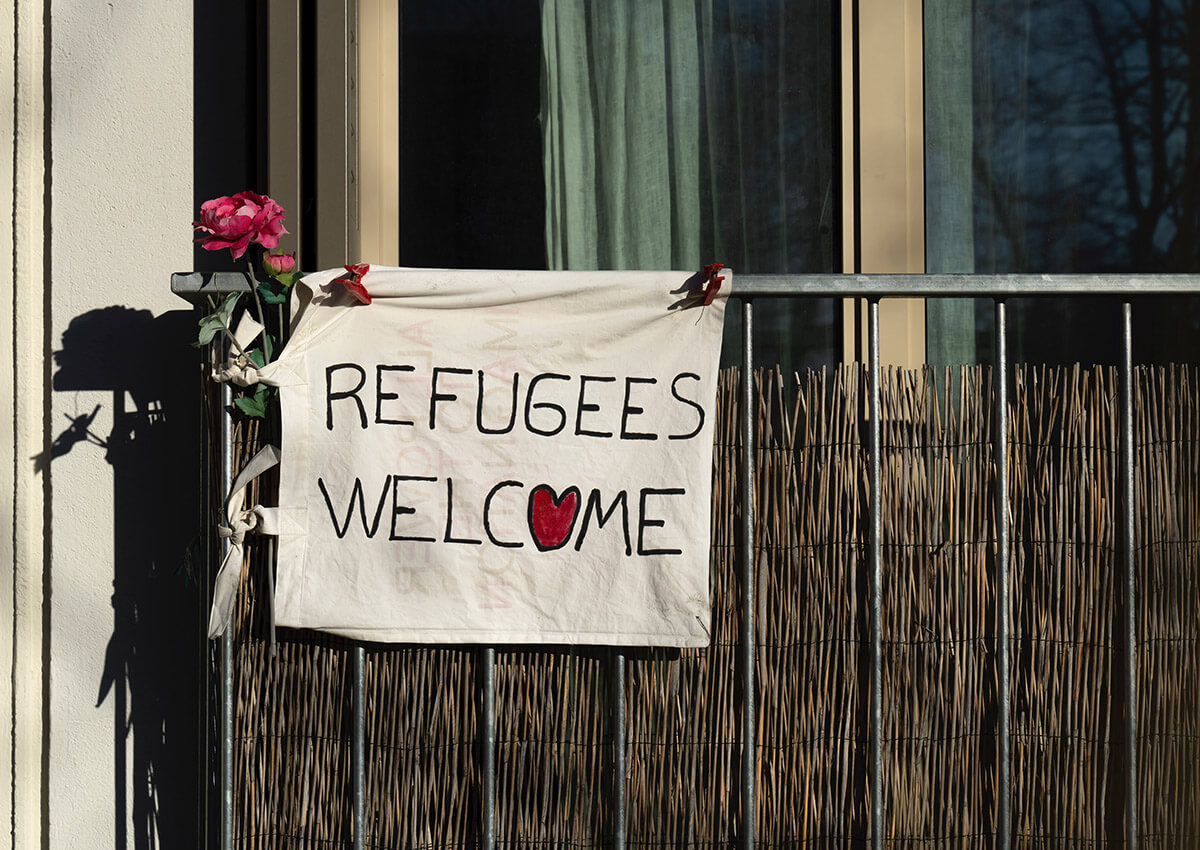Seeking peace
Escaping from war, escaping from an almost certain death. Looking for a future when someone is destroying their past and their present. This is how we can succinctly summarize what leads someone to seek refuge in a country that is not their own.
Refugees leave their country because they have no other choice. And they are held hostage to the goodwill of those who receive and protect them. When someone becomes a refugee, they always hope that it will be a temporary condition and they have, deep down, the desire to return to their homeland one day. Life often turns around and the host country becomes home.
We had the opportunity to speak with Dr. Lori Wilkinson, sociologist and professor in the Faculty of Arts Sociology and Criminology at the University of Manitoba, to try to understand how the world is reacting to this wave of refugees, which at the European level is the largest since the Second World War. And we also try to understand if Ukrainian refugees are being treated differently from other waves of millions of people who once had to flee for survival.
Milénio Stadium: The war in Ukraine is generating a humanitarian crisis that as of yet has incalculable dimensions, and is already succeeding in sensitizing the world. What is different about this war? Do we all feel that this time we are also, in a certain way, under threat?
Dr. Lori Wilkinson: I have two responses. The first is based upon empathy and how we respond to human tragedy. The second involves what we as citizens are willing to put up with in regard to punishing countries that routinely flout international laws.
I think that for many people, your feelings about the war in Ukraine really depend on your standpoint and personal history. For people in Canada, especially the 1.3 million of Ukrainian descent, the war is deeply personal and hits close to home. They have relatives and friends there who are under direct threat, facing indiscriminate bombings, having to leave all their belongings and flee (either internally or externally). Many have had to leave their fathers, husbands, brothers, sons, disabled and elderly relatives behind. These attachments make the war closer and more threatening for many people. The element of surprise can also be seen in these conditions. Could anyone imagine just two months ago that the world would no longer be talking about Covid-19 because Russia invaded Ukraine without provocation? For others, the mere thought that other human beings are being attacked, killed and forced to become Russian is one that encourages much empathy.
Not only do Canadians feel threatened by Russia’s aggression (we share a very important border with Russia, by the way), but the fact that Russia has been allowed to invade a sovereign state and to simply assume its annexation is very problematic. Our collective failure is that the international community has placated Russia for a very long time and they have not suffered any consequence. Russia annexed Crimea and the world turned a blind eye toward this annexation. Furthermore, Russian government operatives have been linked to the assassinations of over a dozen “operatives” and yet the world has done nothing. There is ample evidence that Russian has interfered in international elections and is responsible for widespread misinformation campaigns on social media which harm and destabilize our populations. Once again, the international political community has done very little to end this practice. At what point will the world say “enough is enough”? We have to ask ourselves, what are we willing to accept as an international community with regard to the naked aggression we are seeing on the part of Russia?
For the first time, the European Commission has enacted the Temporary Protection Directive—a piece of legislation passed in 2001. As members of the European Union, Ukrainian nationals are entitled to immediate and emergency support to flee the war. As special protected persons, this legislation gives refugees access to temporary settlement services such as housing, temporary residence and employment permits. No other refugee groups have been given this status in the 21 years since this Act has been created.
MS: The reception that many countries are giving to Ukrainian refugees differs substantially from what’s been given to refugees from other wars. In Europe, for example, many people are making their homes available to take in Ukrainian families. Why do you think this is happening now and did not happen with Afghan or Syrian refugees?
LW: I agree for the most part. Ukrainian nationals are receiving slightly different attention internationally. The EU Temporary Protection Directive is only one example. However, we (Canada and the international community) have prioritized various refugees in the past. The closest example I can come up with is the conflict in the former Yugoslavia in the mid 1990s. I have a good memory of this event because I was examining a new refugee resettlement policy being tested in Alberta.
At that time, there was great government and public interest in providing immediate protection for the civilians from the former Yugoslavia. Canadians made monetary donations, offered spare bedrooms, and volunteered to help this group of people successfully resettle in Canada.
With the Syrian crisis, large scale assistance did not start right away. Canadians did not become as galvanized until Aylan Kurdi’s body washed up on the shore of Turkey. He, his mom and his little brother all died as they made the journey which would hopefully bring them to Canada. The image pulled at the heart strings of Canadians. Many Canadians don’t know much about refugees and the thought that this family died trying to get to Canada in this risky manner was unthinkable. I spent a lot of time speaking to volunteer groups, church groups, media, and the like after that happened. My hopes were to educate Canadians about the world we live in and the causes of crisis and flight. Many Canadians stepped up, volunteered and /or donated to causes to help resettle the 60,000 Syrians who came to Canada.
Afghanistan was a bit different. The crisis came during a pandemic so reception conditions were not similar. I think that a lot of the coverage or possible media coverage around the issue was drowned out by the pandemic. Covid-19 was still frontpage news then. Missed were some amazing stories. Did you know that Air BnB Canada donated nearly $150,000 to help shelter newly arrived Afghans for 3,384 nights? This donation was very important as research finds that those refugees who have access to their own kitchen and own living space (as opposed to being crammed in small hotel rooms and having to eat buffet food) actually settle faster and integrate more successfully. That little act of providing a private space for families to cook and sleep and live “normally” means so much to refugees—especially those who have not had that opportunity for many months. Uber also came through with a very important donation. They provided 1,698 free rides for Afghan families to medical appointments and appointments as they settled into Canada. This was a valuable service as the families would not be forced to navigate complex and confusing bus systems in their new home just as they arrived. Those good news stories have been lost in the coverage of the pandemic. This is understandable but unfortunate.
That said, there’s another reason that Ukrainians are getting attention: they are white and Christian and European—issues I will touch upon in question 3.
MS: Does the fact that the Ukrainian people are recognized as hardworking and often qualified people with higher level education helps the world be more empathic with them than with citizens from different places? In other words, do countries recognize that these refugees can be an asset to whoever receives them?
LW: I think that’s only part of the answer. Most refugees arriving from Ukraine today won’t be able to speak English or French when they arrive. There’s no “time” for them to prepare to learn our official languages given the speed at which they were uprooted from their homes. That will make finding work, at least in the short term, more difficult. The fact that there is an already well-established community of Ukrainian Canadians certainly helps—and there will be some people in this community who can still speak Ukrainian. That will help too, especially with regard to finding work and settling in and learning English or French). According to the last census, the cities with the largest number of Ukrainian speakers are Toronto, Edmonton and Winnipeg.
But not all refugees that come will be highly educated or highly skilled. Just think of the Canadian population. We are not all highly educated or highly skilled either. Research shows, however, that refugees regardless of their skill level, will pay more in taxes in their lifetimes than they will ever ‘take’ in the form of settlement services, language training and health care. In fact, on average, refugees are net financial benefits to Canada and countries like it. Why?
1. Refugees are young. More than half of all the world’s refugees will arrive at their country of destination prior to their 29th birthday. This means they will have some exposure to the Canadian education system (most will be going to public school for some time), many will take on post secondary training in Canada. They will get jobs and they will pay taxes. I hate speaking about refugees in this way but there is an economic benefit for them to be in Canada
2. Because they are young, most will have decades of history in the labour market—which means they earn money and become self sufficient. Now this process takes some time—but even when it takes a decade, refugees are still a net economic benefit
Countries that do not have a support system for genuinely settling refugees find that it takes a long time for refugees to integrate socially, culturally and economically. In some cases, integration does not happen at all. In these countries, receptivity towards refugees is less welcoming.
MS: In any case, this is one of the biggest migratory waves in the world. What consequences will it have for the receiving countries?
LW: Sadly, Ukraine is not unique. We have had other large scale and sudden movements of people. We are still counting the number in Afghanistan, but the Americans emergency airlifted 175,000 people in under three weeks. When the final tallies are in, I would not be surprised to learn that the Afghan numbers are bigger than the numbers in Ukraine. They join the already 3 million Afghan refugees who were displaced prior to the fall of Afghanistan. In Syria, 6.8 million people have left the country in a very short period of time. In both cases, the refugees live close to the Afghan border. This is how refugee crises usually work. It is incredibly difficult to find resettlement very far from one’s homeland.
So the question really ought to be “what consequences does the world face if we do not address the causes of political, economic and environmental crises” in our world? Right now, there are more refugees in the world today than there has been at any point in human history. In addition to the 26.4 million people who are refugees (note that over half are children), there are 48 million people who are internally displaced (so refugees in essence, but have not been able to leave their country) and another 4.1 million asylum seekers. That’s 82 million people in need of assistance and resettlement because of world conflict. This number does not include the 2 million Ukrainians who have left Ukraine (and we do not yet have a good count at the number of internally displaced which likely numbers in the hundreds of thousands). Nor does it include Afghanistan (official numbers won’t be available for months).
In June of 2021, before the fall of Afghanistan and the attack on Ukraine, the UNHCR estimated that 1.47 million people would require permanent resettlement in a country outside their own in 2022. We can easily double if not triple that number if we now consider the Ukrainians, Afghans and other refugees who are fleeing war, violence, drought, and famine. In a normal year, only about 100,000 people are resettled.
What I am trying to say is that we need to recognize that what is happening in Ukraine is intolerable and unacceptable. That bystander countries like Poland, Moldova, Slovakia, and Romania are hosting hundreds of thousands of recently displaced persons who are fleeing Ukraine. However, people are facing similar situations in Venezuela, Central African Republic, Iraq, and Syria, and the countries “next door” are greatly suffering under the weight of long-term refugees who must resettle there. Pakistan, for instance, is home to over 1.9 million Afghans and that was before the Taliban takeover. Poland, Moldova, Slovakia, Hungary, and Romania, among others, will see large increases in refugee arrivals in both the short and long term as the situation further develops in the days and months to come.
MS: This is a war that is developing “under our eyes”, with a media dissemination component never seen before, specifically through the various social network platforms. Has this factor also helped to create more empathy and compassion?
LW: Maybe. I don’t know the answer to that. I have been surprised at how many news outlets have media personalities embedded within Ukraine or Poland. Certainly other world disasters do not receive that kind of attention. I think with the proliferation of online news and social media platforms, there are more ‘eyes’ on the ground. The more personalized social media platforms like Instagram, Facebook, TikTok and Youtube have ‘democratized’ the sharing of images and have made it much easier for people trapped to share the images as they occur.
I think, however, we need to give credit to the large number of people who have been tirelessly working at educating, working and volunteering with refugees and to those who share their messages and experiences. This is valuable work that helps all of us better understand the plight of all humankind. To understand that we are all precious—all of us, no matter where we live, what we look like, what religion we practice or what language we speak. I think what is lost in our society (and in our politics too) is that people are considered as close or as far away. Close people are people ‘like us’ who need protection. We can empathize with them more because we see ourselves inside them. People who are far away can be more easily ignored. They are not like “us” and some humans feel better about ignoring their plight.
What we tend to forget is that humans are a precious and rare entity. Think of how precarious our earth is. The delicate balance between oxygen and carbon dioxide—small changes to either mean our certain death. What ought to unite us is that as precious beings, our life here on earth is precarious. We need to tend to people like we tend to our gardens—with love, care and attention. If we cared for one another as precious human beings, it would be more difficult to ignore war, famine, conflict and unrest—because precious entities are suffering. In this way it is precious people, whether they are in Ukraine, Yemen, Syria, Central African Republic, Venezuela, or who are in our own backyards who are suffering and we cannot let precious people suffer.
MS: As a sociologist, as of right now, what are your main concerns regarding this issue – refugees from the war happening in Ukraine?
LW: My first concern is Ukraine—its people and the land itself. Can it survive this attack as a separate and free political entity or is the world going to allow Russia to just annex it without consulting with the people? If we just sit back and allow Russia to claim their land, who’s to say that another country doesn’t follow Russia’s lead? Who knows if Russia will stop at Ukraine? After all, their rationale for attacking in the first place is their claim that Russians and Ukrainians are historically the same people. Does this mean that former Soviet Republics must prepare for invasion? What about other countries that share borders with Russia? Is Canada next?
My next concern is the countries next door. How long can Moldova, Poland, Romania and the other neighbouring countries keep these refugees safe? Are they in danger of a Russian invasion? Many of the refugees will stay in these countries permanently, regardless of how the crisis in Ukraine ends. This is because their homes, businesses, schools and other places are destroyed. There’s little to return to. Yes, there may be efforts to rebuild from within, but that takes decades—even though the destruction takes only days. Many will stay in the neighbouring countries and make their lives there. Some may come to Canada either temporarily or permanently. Most Ukrainians will have not made that decision just yet because they still have hope of returning.
Finally, I think about the resettlement of the Ukrainian and all the other refugees who are coming to Canada or settling elsewhere. As I mentioned earlier, there are 84 million people who are refugees or who need protection, this is the largest number in the entire history of our world. Did your readers know that the UNHCR was supposed to be a temporary agency? It was set up to resettle the millions of people displaced during World War 2. It had a five-year mandate. Now, 76 years later, we are dealing with larger and larger numbers of people who are displaced and have no other alternative other than to seek refuge, largely in places very far away from home. When will humanity start treating all people as precious commodities? No one wants to leave their home and until the world decides to treat each other with care and compassion, there will be no end in the refugee crisis that has shaped our world for the past 100 years. In the short term, assisting countries to successfully resettle refugees—give them a chance at a real life is the best option. The better option, however, is to find a way to prevent or stop war and crises in the first place. This means that the people, worldwide, have to demand action from their political leaders, to address conflicts head on, to punish countries that consistently break the laws and flaunt human rights. Our failure to do this means refugee crises will continue, unabated, for years to come. No one wants that.
Catarina Balça/MS









Redes Sociais - Comentários